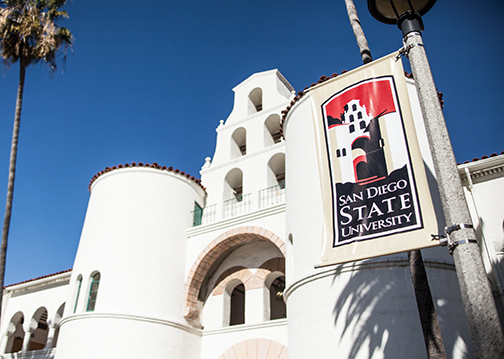The most recent national viral concern has reached the San Diego State University community, exactly 900 days since SDSU began to began to shift to virtual instruction due to the COVID-19 pandemic.
On Sept. 1 Student Health Services sent out an email health advisory to the campus confirming the first known case of monkeypox in a non-residential SDSU student. According to the email, exposure risk on campus remained low and the student was isolating and recovering.
“We have been preparing for our clinical team since we started seeing monkeypox present in the United States,” Director of Student Health Services Libby Skiles said.
Information about the monkeypox virus, preventative steps, testing information, resources and answers to frequently asked questions are available online through Student Health Services.
As of Sept. 12 the single case remains the only one within the SDSU community. Currently available data from the San Diego County Health and Human Services Agency counts 334 cases within the county through Sept. 8.
“The County of San Diego is a fantastic partner for us and had session after session,” Skiles said. “(They’ve made) sure we as a health care community had everything we needed to get our community members assessed, tested and to get those close contacts assessed, tested and treated.”
Notification from Student Health Services of the positive test helped SDSU know that they needed to inform the Aztec community about the potential spread of the virus.
“What’s concerning about monkeypox is we’ve known about it for so long, but these kinds of outbreaks have been rare in the past,” Dr. Eyal Ohren, associate professor for the division of epidemiology and biostatistics in the school of public health, said.
“There have been very few deaths of monkeypox, and the severity is also very much linked to age group and risk,” he said. “Severe disease in young adults, I’d say, is highly unlikely.”
One trend found in confirmed and probable monkeypox case data is that the highest percentage of cases have occured among individuals that self identify as gay, lesbian or same-gender loving. According to Ohren, this mirrors national trends.
Student Health Services included the PRIDE Center as part of the response preparation, message planning process and more. Skiles said it is no different than many other communicable diseases where specific communities face greater impact.
“It’s a really important element to make sure that our team members who specialize in supporting these populations were able to give input and be part of response planning,” Skiles said.
Though monkeypox is a virus like COVID-19, according to Skiles, SDSU has made sure to be as informative as possible at every step of the way. The first outbreak has helped the information effort and limit the spread.
“My freshman year was cut short due to COVID,” said senior computer sciences major Camden Powell. “I’m a bit worried, but also hopeful and optimistic that won’t happen again.”
For Skiles, it comes back to the partnership within the community.
“We can send the guidance, and our community does pay good attention. They respond and they take the measures we ask them to take,” she said.
“That care they exhibit for themselves and others is such an essential piece of this.”
Editors’ Note: An earlier version of this article referred incompletely to the shift to virtual instruction at SDSU. This version has been edited for clarity.









